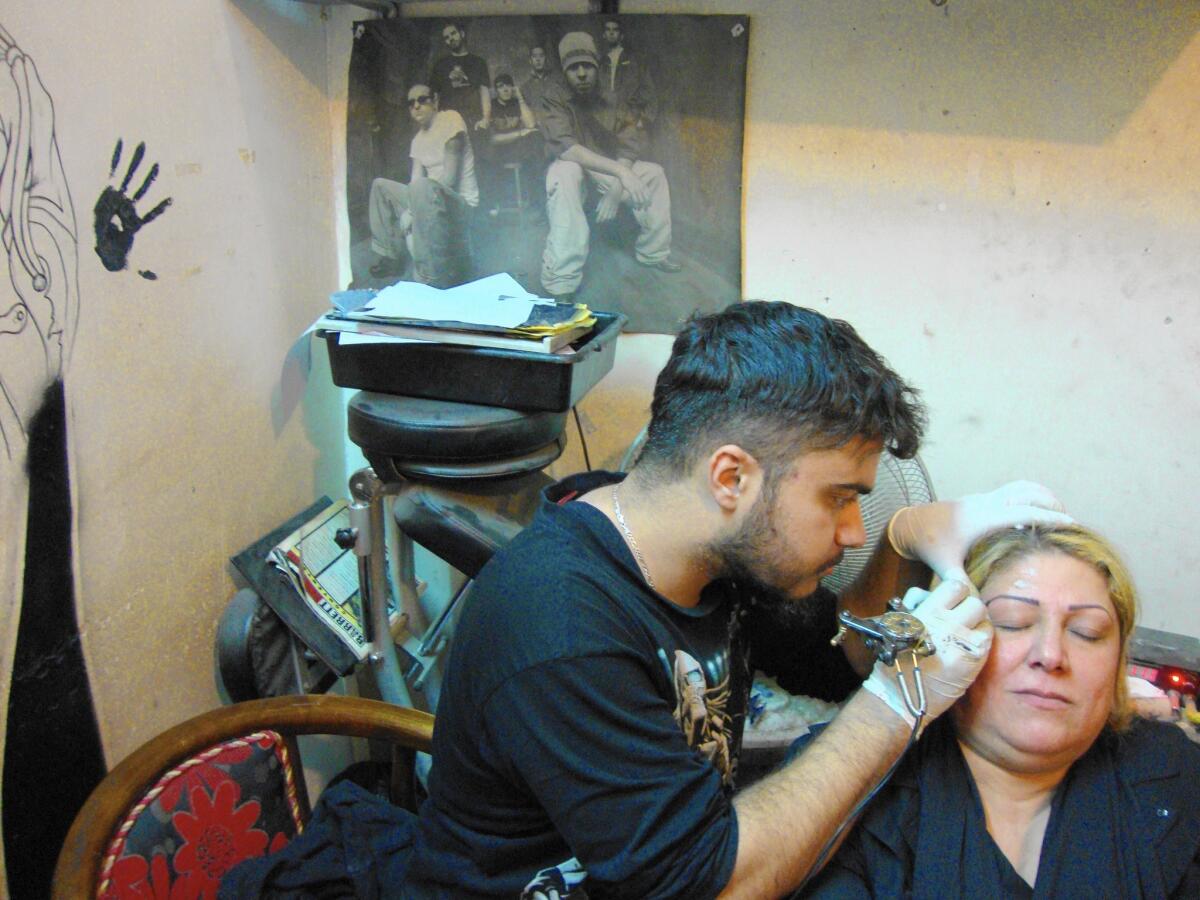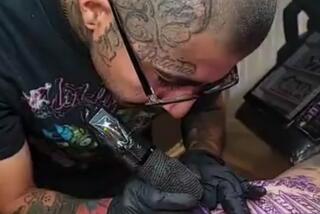Great Read: In Iraq, ex-interpreter makes his mark as tattoo artist

- Share via
Reporting from Baghdad — The short, chubby Iraqi interpreter watched as the massively biceped American soldiers he worked for shot hoops during their breaks from guarding the Baghdad airport.
It was 2006, and although Mohammed Akram Taher, 17, shared the troops’ love of motorcycles and Metallica, he couldn’t compete with them on the basketball court. So he sat on the sidelines, sketching.
One day, an Army sergeant from Los Angeles glimpsed the Baghdad native’s artwork: macabre drawings of grinning skulls and demons. The sergeant was intrigued. He happened to be a tattoo artist with a sleeve of tats on each arm.
“You should do tattoos,” the sergeant told Taher, who, like most interpreters, went by a nickname. His was Dante, in homage to the medieval Italian poet.
And that is how Dante, now 25, ended up inking his first tattoo: a smiley face drawn freehand on the arm of the American sergeant.
As word quickly spread around the airport, Dante attracted unlikely customers.
“I started doing them on the Iraqi soldiers,” recalled the tattoo artist, who still goes by his nickname.
That was a switch. Tattoos have been stigmatized for generations here for the same reasons they were for many years in the U.S. — seen as the purview of criminals, with the exception of some simple tribal tattoos in rural areas.
With the U.S.-led invasion, Iraqi attitudes about tattoos, like so much else here, changed.
The Iraqi soldiers who approached Dante wanted tattoos of traditional images of wolves and roses, or classic Arabic phrases: “My precious mother” and “Ah, time!”
He also knew that Iraqi civilians were getting their names and phone numbers tattooed on their thighs for a more poignant reason: identification, in case they were killed in the sectarian violence engulfing the capital.
Dante never gave himself one of those tattoos. He says he wasn’t afraid of dying. Instead, he inked a heart worthy of Gray’s “Anatomy” on his stomach and, next to it, a teddy bear clutching a bloody ax. On his left thigh, he added a devil’s face.
Despite his popularity as a tattoo artist, Dante kept his day job. He loved working with the soldiers who had recruited him as a teenager. Like many interpreters, he kept his job a secret from neighbors and acquaintances for safety reasons. (He still doesn’t like to share the Los Angeles-based sergeant’s name.)
Then, one day in 2008, a mortar shell struck the airport. Shrapnel pierced his right arm, the one he used to trace his tattoos. Dante was taken to a hospital, where he told the doctors not to remove the fragments. He wanted the bumps stenciled under his skin as a reminder of the attack.
He went home to find his family shaken. His father was a bank worker, his mother a homemaker, their younger son a civil engineer. They wanted him to quit his interpreter’s job. It was too dangerous, they said.
Dante had a better idea anyway. He had been saving money. He would open his own tattoo parlor, one of the city’s first.
::
When Dante started his business in late 2008, Iraq was still at war, but many Iraqis were embracing American culture.
Versions of American fast-food restaurants first established in the Green Zone, the fortified area housing American government offices and businesses, were spreading around town selling pizza, hamburgers, French fries and fried chicken.
Some of Dante’s customers in the cosmopolitan Jadriya neighborhood along the Tigris River wanted patriotic symbols — eagles and tigers, Iraqi and U.S. flags. Others who listened to American rock music, dressed all in black and called themselves emotionals, or “emos,” sought darker images — spiders and demons.
Dante ordered a new tattoo gun online, a silver model embossed with grinning skulls and the loaded chambers of a six-shooter, and got to work.
“Anyone who works with the U.S., it changes your culture,” said customer Fahed Uqaiy, 26, a bulky former security contractor wearing a Monster energy drink cap and a fanny pack labeled “Sports.”
Nicknamed “General” by the U.S. contractors he worked with, Uqaiy joined them in getting matching skull bicep tattoos in addition to an enormous tribal tattoo on his back, by Dante.
By 2012, most of Dante’s customers wanted to be inked in places that could be concealed. Religious conservatives hated the tattoos.
“If they saw it, they would hurt you,” he said.
Getting tattooed in Iraq is still risky, said Uqaiy, who had come to see Dante for a tattoo of the logo of the action movie “The Expendables,” a skull atop wings made of guns and knives.
“I live in a militia area, so I have to have it up here,” he said, pointing above his T-shirt line, where his enormous left biceps had been scarred by a roadside bomb.
As Iraq’s sectarian divide deepened in recent years, the demand for tattoos has changed. Dante, a non-practicing Sunni Muslim, started getting more religion-related requests. He has tattooed praying hands clutching rosaries for Iraqi Christians, Sunni images of Ali, the son-in-law of the prophet Muhammad, Shiite Muslim images of swords and the martyred Imam Hussein.
“I’m doing more now, not normal people — militias,” the goateed Dante said, shrugging.
::
Iman Jamil’s teenage son Yassir was shot and killed by militants in 2005.
Recently, she headed to Dante’s tattoo parlor, where she stripped off her head scarf, plopped down on a stool and let her three children watch him tattoo a Y on her wrist in memory of their brother. Dante swiped an Old Spice deodorant bar on her wrist, applied a stenciled drawing of the tattoo, then began tattooing over the design.
As Dante worked, Jamil, 44, smoked and recalled how, when she was a girl in Baghdad, “women would get tattoos if they had a bad reputation.”
“In recent years,” she said, “attitudes have changed. I know I am good, my daughters are good, so it doesn’t matter.”
Jamil was also having her eyebrows tattooed, a common request these days.
Dante wore his usual black apron over a faded T-shirt with a grinning skeleton playing electric guitar. A shock of brown hair hung over his eyes as he slipped on latex gloves and traced Jamil’s brow line with his buzzing tattoo gun, occasionally dipping it in a pot of black ink beside him.
Jamil barely winced as her skin turned pink.
Suddenly, a power outage cast the room into darkness, a common occurrence here. Dante paused as he and others in the cramped back room whipped out smartphones for some light. Moments later, the electricity clicked back on, and Dante continued. So far, the outages have never caused him to make a mistake, he said.
Next, it was the turn of Jamil’s 18-year-old daughter, Madia. Her brows were already lightly tattooed. Her mother suggested she darken them.
At first, she balked, worried about the pain.
“This girl is so stubborn,” her mother chided. “Just do it!”
Eventually, she did.
::
Dante has just opened a larger new shop in a mixed commercial area of Karada, the middle-class neighborhood where he grew up, among the safest in the city. Its main thoroughfare is lined with bakeries, restaurants and cellphone and clothing stores, as well as a few other tattoo shops.
One day last month, the line at Dante’s shop snaked out of the cramped back room with tinted windows, across the worn linoleum and into a dim, smoky waiting area. There were men and women, gay and straight, Christian and Muslim, Sunni and Shiite, about 20 in all. They would wait for hours to get inked.
A young Sunni man who had fled Islamic State militants in western Iraq’s Anbar province days before arrived at the shop looking to add an EKG line to his wrist with a heart at the center.
A Christian patron rolled up his sleeve — he already had “Jesus” scrawled across his forearm, but heard Dante could add fluorescent colors that would make it glow in the dark.
Another showed off Dante tattoos on his back, written in English next to the image of a break dancer, “I want life and I don’t want die.” On his stomach, he sported a black handgun tattoo.
Unlike many other Iraqis who worked with U.S. forces, Dante didn’t apply for asylum in the United States. If he moves, he said, it will be to a tropical paradise like Malaysia.
Dante, like many Iraqis, has a complicated relationship with the U.S. On his right leg, he has an unfinished tattoo: the Grim Reaper, draped in an American flag.
molly.hennessy-fiske@latimes.com
Special correspondents Nabih Bulos and Murtada Faisal contributed to this report.
Twitter: @mollyhf
More to Read
Sign up for Essential California
The most important California stories and recommendations in your inbox every morning.
You may occasionally receive promotional content from the Los Angeles Times.














